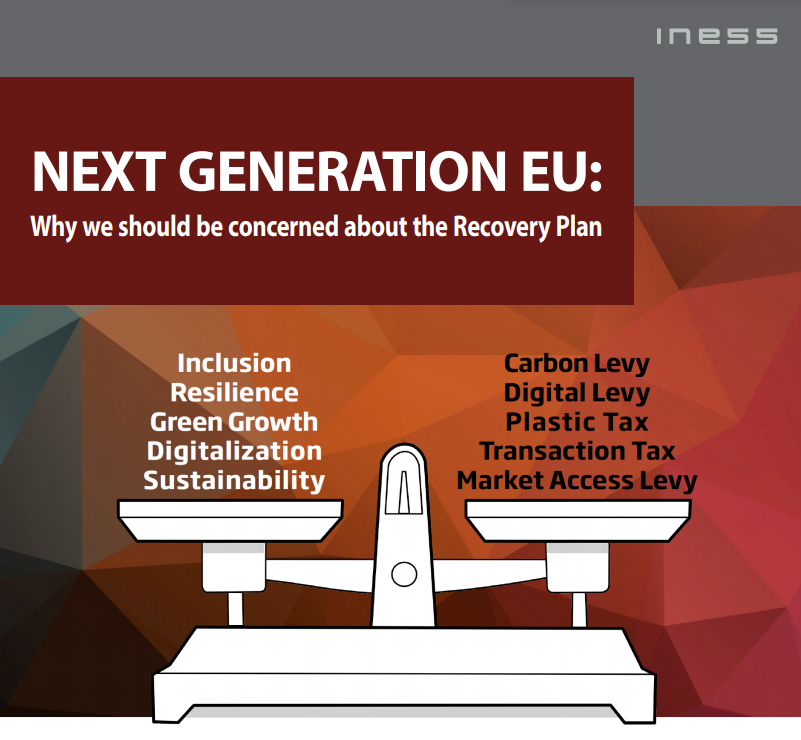Slovakian economic analyst Martin Vlachynský talked in the CEA Talk podcast about why Europeans should be concerned about the EU’s €750 billion coronavirus Recovery Plan, how the European Union is moving in a centralized direction and the Visegrád Group countries are seeing Brussels as a source of money.
Host: Zoltán Kész
In the eyes of many, the European Union for a long time was an opportunity to create an open, decentralized market for goods. This has suddenly changed and not everyone sees the developments in a favorable light.
“In the last 10-15 years, we have seen that the EU is moving towards a certain form that we are not happy about,” Mr Vlachynský says. The Next Generation EU (NGEU) program equals a sudden centralization and contributes to a more centralized and more bureaucratized Europe.
The economic analyst sees the “permanent temporariness” of the NGEU as one of the most critical points. Officially, the plan should not last longer than 7 years, but paying it off should last until 2058.

“We believe it’s almost impossible that after such a long time, the new generation of politicians will just simply turn around and re-work everything what will have been done by then: new taxes, new structures and the building of this program.” „The NGEU is like opening a Pandora´s box,” he claims.
Extending the EU budget, implementing new taxes, and increasing the EU´s debt could become the primary answer to any future crisis. As future crises are inevitable, Europeans “will find themselves in a situation when apart from paying off NGEU, they will also have to pay off NGEU 2.0 and NGEU 3.0.”
What should be done?
“We believe such a program should not exist. They say it’s a reaction to the Covid situation, but it’s really not,” Mr Vlachynský states.
The coronavirus crisis is connected to operational costs. Many shops and companies are closed; they don’t know how to run through this time. “This is not a problem of capital expenditure,” he warns.

Though, Next Generation EU is a major package of focused capital expenditure mostly on green and digital projects. One-third of all the resources should be used for green purposes, one-fifth for digital purposes. Nevertheless, fundamental differences between the countries are ignored. “Some countries are greener than others, some are more digitalized than others.”
Who pays the bill?
Leading politicians from France and Germany claim big international corporations will pay for the carbon and digital taxes, but this is “not really true”.
In the end, EU citizens will have to cover the NGEU costs through taxes to be introduced across the EU in the upcoming years. “It’s not free money, it’s not coming out of the blue sky.”
EU becomes more isolated from globalism
In the future, due to new taxes and regulations, the European market will not be accommodating to big digital companies anymore. It could even happen that Big Tech companies and investors will rather restrict their activities in Europe than to undergo new expenses and new regulations. These firms could put their focus on other regions of the world with larger and more attracting markets.

Europe could even see digital giants cut their services due to restricted GDPR rules. “Global media outlets could limit the access of European consumers to their portals for not complying with new GDPR regulations,” Mr Vlachynský warns.
Lack of motivation for true reforms
Most of the big reforms back in the past happened during difficult times. Usually these took place because politicians did not have any other option. However, Mr Vlachynský is afraid that reforms, due to large sums of money involved, could be postponed this time.
In Slovakia, his home country, the education system needs deep reforms. Though, reforms do not require money in the first place. “The way how Slovak schools and education work should be changed,” he says. Politicians should invest their political capital and their popularity into changes that may not be popular.
“If they get a lot of money, they will repair some schools, install computers in the classrooms and purchase expensive books, but that is not a reform, just spending.”
The future of the Visegrád Four
The V4 countries have lot in common regarding the past and their behavior in the EU. The common experience in the 90s gave the Visegrád Four a “head start” in understanding markets and implementing reforms. “These sweeping reforms are today unimaginable in the west,” he claims.
Less positive is the” opportunistic behavior” with which the V4 countries are looking at the EU. “They are looking at Brussels as a potential source of money.”

The fact that Slovakia holds with 13 per cent the record negative turnout in an EP election shows that Slovakian citizens don’t care about European policies. “We just care about getting the money without conditions.”
However, this kind of behavior, is poised to fail in the long run as the EU is shaping a large amount of policies. “We are simply accepting policies in the social, immigration, monetary fields, but not really discussing them.” Slovakians see the EU as something distant and out of reach. All this can be a problem in the near future.
Cover photo credit: Kenzo Tribouillard, AFP, Getty Images

Martin Vlachynský is an economist and has been working as an analyst at the Bratislava-based Institute of Economic and Social Studies (INESS) since 2012. He mainly focuses on business environment, state interventions, competitiveness, with special focus on health care and energy sectors. He is the creator of the Bureaucracy Index and the Health for Money Index.
Photo credit: www.iness.sk



